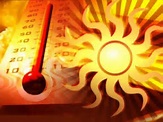
Beating the Heat Can be a Lifesaver

Published on July 1 2019 3:05 pm
Last Updated on July 1 2019 3:08 pm
On average, heat kills more people each year than other weather-related hazards, such as tornadoes, floods and lightning. To increase awareness about the dangers of extreme heat, the Illinois Emergency Management Agency (IEMA) and the Illinois Department of Labor are offering heat safety tips to help people stay safe when temperatures rise.
According to the National Weather Service (NWS), heat accounted for an average of 101 fatalities each year from 2009–2019. During that same period, tornadoes caused an average of 89 deaths each year, while floods resulted in an annual average of 95 fatalities. NWS also reports during that same ten-year reporting period an average of 38 children have died due to heat stroke from being left inside a hot vehicle (16 children have died so far in 2019).
“Heat-related fatalities can be prevented by taking precautions when temperatures rise,” said IEMA Acting Director Alicia Tate-Nadeau. “One of the most important heat safety tips is to never leave children, elderly people, adults with disabilities, or pets in parked cars even for a short time. Temperatures in vehicles rise much faster than many people realize.”
Even with the windows slightly open, temperatures inside a vehicle will rise 30 to 40 degrees in less than 30 minutes. The effects of hot cars can be more severe on children because their bodies warm at a faster rate than adults.
Several tragic deaths also have occurred when children got into vehicles without their parents’ knowledge and then could not get out. It is important to always lock car doors and trunks, even at home, and keep keys out of children’s reach.
While heat affects everyone, it especially poses danger to those who must do physical labor in the heat and humidity – indoors or outdoors. Heat stroke is the most serious heat-related health problem – in fact, it can be fatal if not recognized and treated quickly.
“Efforts to keep the workplace safe certainly can be thwarted if employers and workers don’t keep in mind the threat posed by hot weather,” said Director Michael D. Kleinik, Illinois Department of Labor. “Employers should train workers and supervisors to recognize the symptoms of heat stroke and to immediately report anyone exhibiting symptoms.”
Symptoms of heat stroke include:
- Confusion
- Very high body temperature
- Hot, dry skin or profuse sweating
- Seizures
- Loss of consciousness
If a worker shows signs of heat stroke, consider it a medical emergency. While first aid is being administered, call 911 if medical professionals are not available on site. Meanwhile, assist the victim to a shaded, cooler place and remove outer clothing. Soak the worker with cool water and, if possible, use ice, a fan or air conditioning to cool the person.
Other hot weather safety tips include:
- Stay hydrated by drinking at least 1½ to 2 quarts of fluids daily, even if you do not feel thirsty.
- Avoid alcoholic beverages and drinks containing caffeine.
- Avoid overexertion and strenuous outdoor activities if possible. If you work outdoors, remember to drink plenty of water and take frequent breaks in the shade.
- Take advantage of cooling centers, public pools and air-conditioned stores and malls during periods of extreme heat. Even a few hours a day in air conditioning can help prevent heat-related illnesses.
- Do not forget your pets. Offer pets extra water and place the water bowl in a shaded area if outdoors. Make sure pets have a shady refuge where they can escape direct sun exposure.
- If you or someone around you begins experiencing dizziness, nausea, headache, confusion and a rapid pulse, seek medical attention immediately, as these could be the symptoms of heatstroke.
The State of Illinois offers many state owned facilities as cooling centers to provide Illinoisans a place to stay cool and comfortable during hot summer days. Tollway Oasis locations are open 24 hours a day, 7 days a week. Department of Human Services cooling centers are open during normal business hours from 8:30AM - 5:00PM, Monday through Friday. For a list of state facility cooling centers visit, Keep Cool Illinois.
Additional tips on how to protect yourself and others from heat-related illnesses are available on the state’s Ready Illinois website (www.Ready.Illinois.gov).
